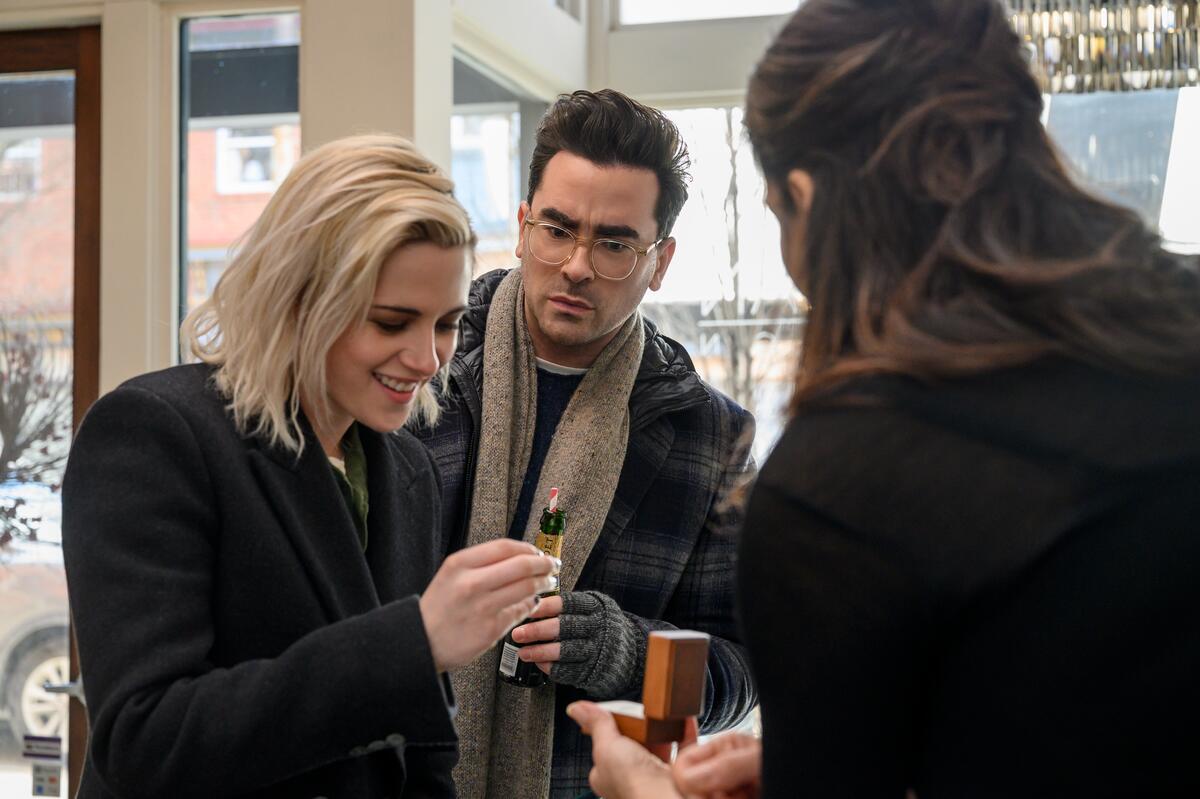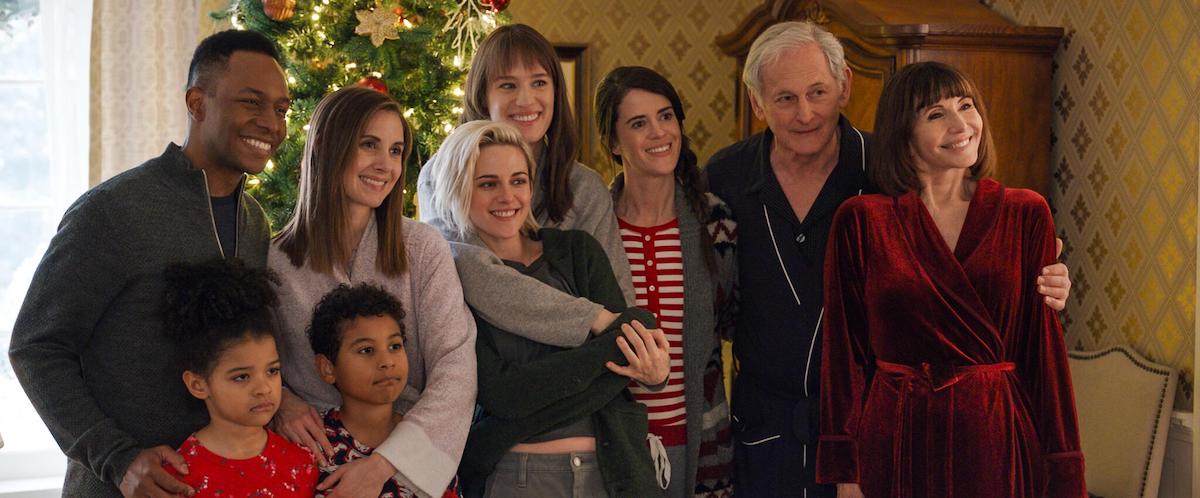The highly anticipated Christmas-rom-com Happiest Season dropped Wednesday, November 25th on Hulu. Featuring a star-studded cast and wholesomely inclusive message, Happiest Season is a film to celebrate, to be sure. The movie is breaking barriers by, pardon the pun, coming out as an LGBTQ+ rom-com for the holiday season, actively challenging a genre that has typically featured straight couples. In that regard, I’m excited to welcome Happiest Season into the cheesy Christmas romance movie canon. Director Clea DuVall added a rare gem to a beloved genre, and I can understand why so many viewers, LGBTQ+ and not, enjoyed the film.
However, after watching this film, I’m honestly not sure how to feel about it. It’s decent, as far as a Christmas rom-com goes. My uncertainty, however, lies with its representation. Happiest Season is a coming out story, but one that feels tired and reliant on LGBTQ+ tropes of yesteryear. For as revolutionary as it is, Happiest Season also felt like a step backward in the world of representative media.
The Rundown
If you haven’t seen it, Happiest Season is a Christmas reunion story. Harper Cladwell (Mackenzie Davis) decides to bring her girlfriend Abby Holland (Kristen Stewart) home for Christmas. The problem is that Harper hasn’t come out to her conservative, politician family. Abby had agreed to the trip believing otherwise, and she even had plans to propose to Harper on Christmas morning. Because of Harper’s secret, the trip turns into a disaster, with Abby and Harper sneaking around the Cladwells while drama ensues regarding Harper’s father’s mayoral run. Fans of the film found enjoyment in Aubrey Plaza’s character, Riley, Harper’s ex-girlfriend who was outed by Harper in high school. Daniel Levy, of Schitt’s Creek fame, provides comic relief in his character John, Abby’s best friend.
Blissfully Self-Aware

Abby admires the engagement ring she plans to give to Harper while John looks on. Image via Hulu.
Within the first 1o minutes of the movie, the dialogue between Kristen Stewart’s Abby and Mackenzie Davis’ Harper is… clunky. What I mean by that is: the couple speaks to each other as though they know they have an audience. Their conversations are expository, dropping information about each other that normal people would never bring up. Director DuVall “wanted the movie to feel accessible to all audiences,” which offers a partial explanation for the overt dialogue.
In being “accessible,” Happiest Season provides a constant commentary to its audience, primarily a straight one, in my opinion. Daniel Levy’s John gives a poignant speech about coming out to Abby towards the end of the movie. The speech, while heartwarming, felt more like a message to the audience.
The Speech
“Remind me, what did your parents say when you told them you were gay?” he starts, addressing Abby. “My dad kicked me out of the house and didn’t talk to me for 13 years after I told him. Everybody’s story is different,” he explains. “The one thing that all of those stories have in common is that moment, right before you say those words, where your heart is racing and you don’t know what’s coming next. That moment is really terrifying.” This is an example of the way Happiest Season capitalizes on being “accessible.”
My Interpretation
In the context of the story and the kind of friendship Abby and John hold, his speech seems like the content they might’ve previously covered as close friends. It’s an unfortunate, terrible reality that some queer youth are kicked out of the house for coming out. Watching the scene, though, John’s anecdote was angled more towards an audience that doesn’t recognize how scary and unsure coming out can be. Abby would know the fear that accompanies coming out, she had done it before and likely many times after she told her parents. The notion of explaining how scary revealing yourself can be didn’t feel like a message meant for Abby, but the audience. And, honestly, it waters the story down.
Happiest Season felt more like a message to straight audiences about the validity of LGBTQ+ experiences. It sought to explain the way every queer person has a different experience with coming out, which is wonderful. On the other side of that coin, though, a character that was already out suffered for this explanation. Ultimately, I don’t think Happiest Season should’ve been a coming out story. Not every queer character’s struggle needs to be about their sexuality, and this should be especially true for a fluffy Christmas story.

Harper and Abby ice skate together. Image via Hulu.
Tropes Galore
On that note, Happiest Season is a film that relies on LGBTQ+ tropes, like the classic coming out story! I do think there’s a place in Hollywood for coming out stories. I think it’s important to represent them in a way that isn’t depressing, though. For years, coming out has been seen as a depressing, upsetting topic, and for a lot of people, it is. However, I think the representation of the other side of coming out, the happy, joyous, freeing side, is important too. Harper and Abby’s story was traumatic for most of the movie, both of them had to hide their sexualities for most of the film. That’s not positive representation.
More than that, queer media has a tendency to focus on the characters’ sexualities, not their romance with each other, and that was a trap that Happiest Season fell into. This film pushes a narrative that Harper must be defined by her struggle with her sexuality, not the beautiful, loving romance between her and Abby that’s showcased at the beginning of the film or her own individuality. It was really upsetting to see that, instead of exploring the complex relationship between Abby and Harper, I was subjected to an hour and 42 minutes of Harper flirting with her ex-boyfriend and Abby being upset. Happiest Season, while intended to be a Christmas movie, fixates on sexuality, and the tragedies that come with being queer around a family that’s unsupportive.
I will say, I am glad that Happiest Season didn’t turn to the “bury your gays” trope. In another world, this movie could’ve ended tragically, with Harper ex-communicated from her family or forced to marry her ex-boyfriend. Equally, the ending could’ve been much more tragic than either of those options, as the trope implies. So while the film rests on other tired media stereotypes, Happiest Season does at least have a happy ending going for it.
The Pedestal of Representation
The past decade has seen an influx of media that is increasingly diverse. There’s been more representation for BIPOC, LGBTQ+ and other individuals who are typically left out of mainstream media in the past 10 years than there have been in all of TV & Film’s lifespan. And, as we all know, there’s still not enough.
Because so many strides have been made with representation in pop culture, Happiest Season let me down. Lies and unhappiness characterize Harper and Abby’s relationship. Harper asks Abby to go back into the closet, all because Harper hadn’t come out to her parents. While I understand Harper’s point of view, in that coming out is scary and difficult, I do not think it was fair to ask Abby to compromise her identity. Not to mention, Harper told her family that Abby’s parents had died, leaving Abby an orphan. While this is true, it also isn’t Abby’s entire identity. Unfortunately, Harper’s family views Abby as Harper’s “orphan roommate” for the better half of the film.
Harper mistreats Abby for the majority of the film, despite a few cute moments. Abby never says no, she always compromises herself, just to make Harper happy. Abby sits and watches Harper flirt with her ex-boyfriend, for goodness’ sakes! Happiest Season desires praise for representing a relationship built on inequitable terms. While I understand the important rep Harper provides, she treats Abby so poorly that both storylines end up feeling unsuccessful. After all the media we’ve had portraying positive LGBTQ+ relationships, I can’t get on board with cheering for this one. In the case of Happiest Season, the representation exists, but it’s lacking in positivity.
I love see how many people are furious at Harper in Happiest Season, because yes she makes a ton of WACK ass choices, but also I’d like to just say Welcome! to all those new folks who suddenly find themselves irrationally protective of and compelled by Kristen Stewart.
— Jordan Crucchiola (@JorCru) November 28, 2020
The Takeaway
I’m caught in the middle with Happiest Season. I’m unsure whether I should love and accept it for the frothy, Christmas romance movie it is or view it critically for the impact it has on LGBTQ+ media. I only know how I feel about this movie, and ultimately, I’m not this film’s biggest cheerleader. While I can laud Happiest Season for taking a significant step in the film industry, I also know that a movie shouldn’t be applauded for minimal, undesirable representation.
Featured Image via Hulu.











